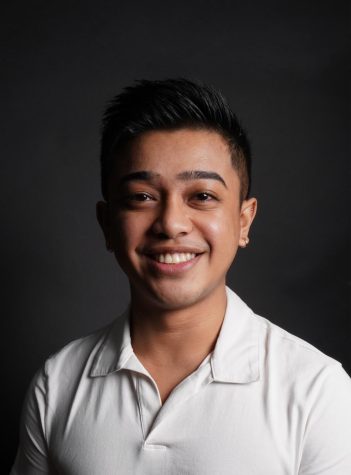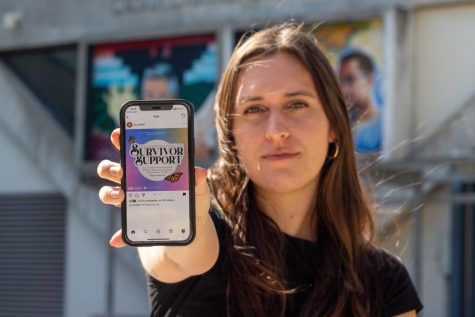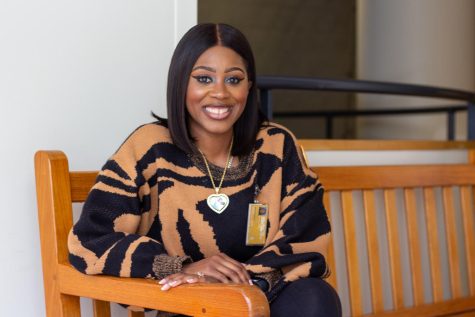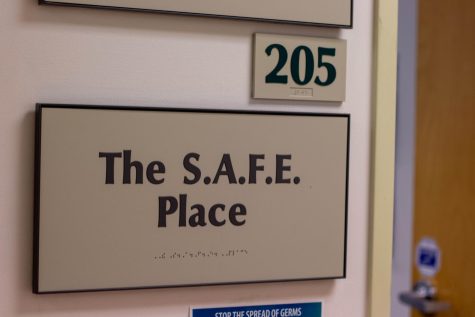
Associated Students approved a support program for sexual violence survivors 2 years ago — what happened to it?
As The SAFE Place remains inactive while SF State searches for its new “advocate,” the opportunity to launch a peer-to-peer resource for survivors of sexual violence sits in the hands of Associated Students.
May 18, 2023

After spending over a week with her family in Orange County, Chantel Bermudez returned to her San Francisco apartment. Her walls are decorated with an assortment of artifacts: a baby blue “Self Care Journal” sits on a floating white shelf next to a succulent, and a foot to the right hangs a graphic-printed university tote bag from SF State, her alma mater. Opening her laptop, Bermudez scrolled through her Google Drive, revealing years of work that remained untouched since her time in school.
Bermudez heavily researched and personally curated each document in her drive, from papers to presentations, and resource handouts to fact sheets. Most of them, however, were not assignments. During her undergraduate career, Bermudez spent four years advocating for a student-led program for survivors of sexual violence that helps students navigate through Title IX and the reporting process, a resource that SF State lacks.
On April 21, 2021, the program passed with a unanimous vote by the Associated Students Board of Directors. Two months later, Associated Students announced the program’s approval on Instagram with a pastel-painted background and butterflies decorating the new serif logo, “Survivor Support.”
“None of it was easy,” Bermudez said in front of her cohort at SF State’s Class of 2022 commencement ceremony. “And while I will never get to see the program blossom and grow once I graduate, just knowing that there was one person who will benefit from that space makes it a flower.”
It’s been nearly a year since Bermudez graduated — and two since the program was approved — but there has been no public word of it since.
“I’ve noticed that it [Survivor Support] oftentimes gets forgotten as an actual AS program,” said Vanessa Miller, an SF State graduate student who previously served on the ASBOD alongside Bermudez. “It’s a passed program.”
Meanwhile, The SAFE Place, SF State’s only counseling and confidential resource for survivors, hasn’t been offering its services since last semester as its previous manager — or what the university refers to as an advocate — left her position.
A personal account of Title IX
Bermudez’s motivation for creating a peer-led program stemmed from her own experience with survivorhood.
“I had a really negative experience my freshman year of going through Title IX by myself, not understanding the process,” Bermudez said.
She learned that the reporting process can be just as traumatic as the assault itself.
This occurred during a period when the Brock Turner case was in the news and Turner appealed his sentencing. All the while, the #MeToo movement was gaining momentum after “actress Alyssa Milano urged victims of sexual harassment and assault to share their stories on social media,” according to the Pew Research Center.
Bermudez disclosed that she is a survivor during a meeting at the Women’s Center, where she was interning at the time.
“I remember just being so motivated, like if these women can come forward and report, I have to be able to do it too,” Bermudez said.
Because the staff at the Women’s Center are mandated reporters, they were required to direct Bermudez to campus officials after she shared her experience. The staff members immediately led Bermudez to the University Police Department to report the Title IX violation.
According to SF State’s Title IX website, “[Title IX] prohibit[s] discrimination on the basis of gender or sexual orientation in employment, as well as in all education programs and activities operated by the University (both on and off-campus).”
The 1972 federal mandate was meant to establish guaranteed equal and just treatment of all genders, shielding them from gender discrimination, which encompasses sexual harassment, sexual misconduct, gender-based dating and domestic violence and stalking.
“Going through a Title IX investigation is not a therapeutic process,” Bermudez said. “It’s not a therapeutic, nor is it a criminal justice process. It is an administrative process. And so that’s one of the things that I think people do not know about is that it’s administrative. When you’re reporting this [Title IX violation], you’re not reporting this to the police. You’re not reporting this to get support. The only thing that they can do is any administrative action.”
Heather Borlase, SF State’s Title IX coordinator, said that the Title IX Office does not administer reparations nor sanctions of any kind, which Bermudez wasn’t aware of before she first reported the violation.
“Our office only does two things: we make determinations about what happened, and then determinations about whether what happened violated the [nondiscrimination] policy,” Borlase said.
Bermudez said her investigation took nearly a year, despite being told it would be shorter. According to the current CSU Title IX and Nondiscrimination policy, “the investigation [of a formal complaint] should be concluded within 100 Working Days from the date that the notice of allegations is provided to the Parties.”
“The reason I took five years to graduate is because the investigation took a year,” Bermudez said. “I was not finishing my finals, I was not making it to class. This was my life — trying to win this case.”
The Title IX Office investigated Bermudez and her aggressor separately, as well as three other witnesses. She received an email with the investigation’s resolution during winter break. Although she had a lot of evidence, the resolution of the Title IX investigation was not in her favor.
“I have pictures and texts, and other people that it had happened to, and I still lost,” Bermudez said. “Who the fuck is winning their cases if I did everything right? That’s when I was like, ‘this system is broken.’”
She told herself she would use all of her privileges and resources to make sure nobody else would have to go through the same thing, creating awareness on campus about what the process truly entails.
“That’s something that students deserve to know. If you go to Title IX, they’re not going to educate you about your rights. They’re gonna put you through just as much trauma as the actual experience that you went through if you don’t have someone or if you don’t have a space guiding you,” Bermudez said.
The university offers different administrative avenues for survivors of sexual violence but lacks student-led resources for those to navigate through these processes and traumas. While Cal Poly San Luis Obispo has a similar program called Safer Campus Advocate, what’s unique about Survivor Support is its peer-led and peer-based structure, a first in the California State University system.
According to a study published in the academic journal Criminal Justice and Behavior by research professor Bonnie Sue Fisher from the University of Cincinnati, only a meager 2.1% of sexual assault survivors reported incidents to police and 4% reported to campus officials. 69.9% of survivors opted to disclose the assault to individuals other than campus officials. Close to 90% of those survivors confided in their friends. Bermudez cited this statistic as one of many reasons why a peer-based program is necessary.
The four-year advocacy
After finding her way onto the Associated Students Board of Directors, where Bermudez believed she could enact real change, she spent the majority of her time advocating for the creation of the program. In June 2020, Bermudez was elected the AS Vice President of Social Justice & Equity. Even while serving as a VP on the AS board — with its slogan “By the Students, For the Students” — she was met with obstacles by full-time staff.
“When I came forward saying we needed this program, they [full-time staff] told me I would need to wait a year,” Bermudez said. “They told me, ‘You’re going to have to create a program proposal.’”
Bermudez was required to write a program proposal and draft a budget, even before the program was considered. She was also asked to seek buy-in from both students and full-time staff.
“We presented to Title IX, we presented to SAFE Space, we presented to the campus administration — there was a lot of pre-planning and work that went into that,” said Ja’Corey Bowens, who served as VP of External Affairs and vice-chair of the Social Justice & Equity Committee alongside Bermudez. “No other program has to write a budget, do the planning, all this execution — no other [AS] program had to do that.”
According to Bermudez, Gator Groceries — the most recent AS program that was passed in 2017 — didn’t have a formal program proposal.
“I do think that if there was perhaps an advisor or executive director who was more in line with actually doing their job, I do think the program will probably be here by now,” Bowens said. “But I don’t think they themselves wanted that program to pass.”
Despite this, Bermudez drafted a 40-page program proposal and a detailed five-year budget plan for the program’s launch. She’s never written a program proposal and didn’t have prior experience with writing a budget or drafting an Excel spreadsheet.
“I’m sitting with my immigrant father having to explain, yelling in Spanish to me about how to create an Excel spreadsheet,” Bermudez recalled, noting that they stayed up until 6 a.m. creating the budget.
She broke down each item needed to launch the program, as granular as detailing the cost of pens.
“I’m literally being a finance major,” said Bermudez, an ethnic studies major. “It’s because I’m a woman; it’s because I’m a survivor; it’s because I’m a student — they think that I’m not qualified to understand the money part.”
Bermudez said getting the program started through AS was the most misogyny she’s experienced in her entire life.
“Chantel is one of the most inspiring women I’ve ever met in my whole entire life,” Miller said, despite only meeting Bermudez over Zoom. “She faced a lot of misogyny and sexism and issues when trying to launch this. I feel like a lot of people didn’t have faith in her — no trust. People didn’t have faith in her and her cause and she really overcame that in every way possible.”
While advocating for the program in AS, Bermudez chose not to disclose her survivorship to her colleagues.
“I definitely recognized being a woman in these kinds of spaces,” she said. “Also, being a survivor — advocating for myself as a survivor — I knew it would be a lot harder for it [the program] to get passed and for people to take me seriously if I had admitted that this had come from my own situation. So that was something that I chose not to bring up in the whole process.”

Shanice Robinson, the senior director of AS’ Cultural & Social Justice programs, is overseeing the program’s launch as it falls in her division.
“I want to make sure that when it launches it’s the best and it’s what the community needs and it’s not something that’s rushed,” Robinson said.
On top of her position with AS, Robinson is a faculty lecturer and doctoral candidate at SF State. She previously served as the education representative on the ASBOD before being hired as a full-time staff member for AS in February 2022, almost a year after Survivor Support was passed.
Robinson said she is restructuring her division to hire another full-time staff member so she can spend more time focusing on Survivor Support’s launch.
“I currently oversee five programs, have 18 staff and that doesn’t include the interns, and Survivor Support needs a person that can focus on it full-time because it hasn’t launched yet,” Robinson said. “Once I get that help, I’m hoping to launch it maybe next spring. But again, we need space.”
The limited space in the Cesar Chavez Student Center has been a recurring issue for student organizations already.
“It’s fully supported by Associated Students, it’s just been a struggle to use such limited space and resources,” said Iese Esera, the current ASBOD chief of staff who formerly worked with Bermudez as a residential assistant. “With enrollment being down, as a nonprofit, our funds are not at the level they were when Survivor Support was passed. It is something that I really do think is going to launch within the next school year.”
No support for survivors
While the SAFE Place remains inactive, the only other outlets for survivors have staff that are mandated reporters: SF State’s Title IX office, University Police Department and Counseling & Psychological Services (CAPS), which has reportedly struggled to provide adequate mental health care for students.

“Unfortunately, I cannot comment about The SAFE Place at this time,” Stacy Peterson wrote in an email response to a request for an interview. Peterson previously managed The SAFE Place. She was the only “advocate” for more than 25,000 students on SF State’s campus. Peterson left in October 2022 and the position has been vacant since.
On May 12 — less than a month from the semester’s end — Robert Haney, the assistant director of residential conduct and support services, sent out a campus-wide email inviting the SF State community to the search committee’s open forum for the position’s final candidates.
“They [the search committee] are doing their final interviews, and they hope to have someone hired by the summer,” Esera said. “But even when The SAFE Place comes back up and running, there’s not a lot of trust with the university when it comes to this kind of stuff because of the lack of support from Title IX.”
Like Bermudez, Robinson had her own experience with the Title IX process. At the start of the COVID-19 pandemic, Robinson faced discrimination in the workplace and reported it to Title IX shortly after.
“When I was going through Title IX, it was not helpful — it was actually counterproductive,” Robinson said. “They made me feel like I was the problem and not a victim of a toxic work environment.”
Robinson noted that she doesn’t think Title IX means any harm, it’s just a result of its processes.
“It’s kind of like going to the police,” Robinson said. “Nobody wants to talk to the police. And then when you do it’s like, ‘Damnit, I’m scared, I feel like I’m going to jail, I’m just trying to report something.’”
She hopes to improve Title IX processes through Survivor Support’s launch.
“I think that Survivor Support can also help Title IX improve the efficiency of their process so people can feel more comfortable,” she said.
According to an extensive 2019 study from the Association of American Universities of more than 108,000 undergraduate students, approximately 41.8% of all undergraduate students have experienced at least one sexually harassing behavior since enrollment. If there were 21,868 undergraduate students at SF State enrolled this past fall, based on data from SF State’s Institutional Research unit, then more than 9,000 SF State undergraduate students could have potentially experienced sexually harassing behavior. However, only 71 students reported a Title IX violation from July 1, 2021 through June 30, 2022, according to SF State’s most recent Annual Title IX Report.
“As we know, sexual assault is a huge issue around the world, but specifically talking about college campuses and Title IX,” Miller said. “The Title IX office isn’t doing enough to support students on campus.”
Earlier this year, state Sen. Bill Dodd, a Democrat from the northern San Francisco Bay Area, introduced Senate Bill 808, which would implement requirements to improve the CSU’s transparency of the Title IX reporting process. This bill called the CSU’s handling of sexual harassment and sexual harassment complaints “woefully inadequate.”
This came exactly one year after Joseph Castro resigned as CSU Chancellor after failing to reprimand a former Fresno State University administrator for workplace misconduct despite receiving multiple complaints.
“We seem to have a systemic problem throughout the CSU system,” Dodd said in an interview with USA Today.


